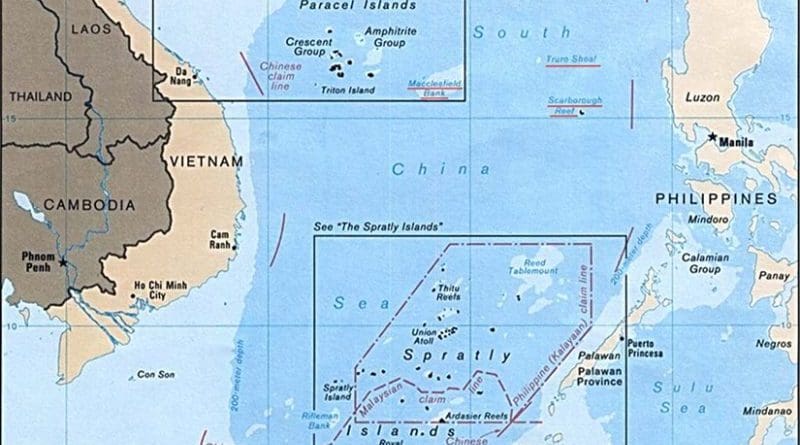Philippines, China Reaffirm ‘Freedom Of Navigation’ In South China Sea
By BenarNews
By Dennis Jay Santos and Jeoffrey Maitem
Beijing and Manila have renewed their commitment to the principle of freedom of navigation in the South China Sea and potential cooperation on joint oil and gas exploration in the disputed maritime region, both governments announced this week.
Philippine and Chinese diplomats met for the second time during a “bilateral consultation mechanism” held in Beijing on Thursday, where the two sides agreed that proper management of disputes in the mineral-rich sea region was “vital in safeguarding regional peace and stability.”
Among other things, “both sides reaffirmed their commitment to the principles of freedom of navigation in and overflight above the South China Sea,” the two governments said in a joint statement issued afterward.
Both sides had a “productive exchange of views”, the joint statement added, noting they believed that developments in the sea region carried serious “political and security implications.”
“Without prejudice to their respective positions on sovereignty, sovereign rights, and jurisdiction, both sides also discussed possible cooperation on joint exploration and development of maritime oil and gas,” it said.
Details of the joint development were not released, but the Philippines had earlier said it was angling for a 60-40 percent sharing deal with China. The Philippines had earlier hinted that the exploration site could be in the vicinity of Reed Bank, which Manila refers to as Recto Bank.
The area lies within Manila’s exclusive economic zone, which is believed to lie atop rich natural deposits.
Apart from the two countries, parts of the South China Sea are claimed by Beijing’s rival, Taiwan, and Association of Southeast Asian Nations (ASEAN) members Brunei, Malaysia and Vietnam.
The agreement came after a Chinese and a U.S. destroyer recently had a close encounter near a Chinese artificial island, after the Americans carried out freedom of navigation operations in the area, according to the state-run Philippine News Agency.
It said Manila’s outgoing foreign secretary, Alan Peter Cayetano, had earlier advised “heart to heart talks” between the U.S. and China, noting that the concept of freedom of navigation operations varied from state to state.
They also agreed to continue with consultations, and referred to an agreement in November last year during which Beijing and China both affirmed that the South China Sea and the territorial dispute was not the “sum total of the China-Philippines relations.”
The next meeting was to take place in the first half of next year, at a still undetermined venue, both sides said.
President Rodrigo Duterte’s government has been working to appease China, which was angered by a 2016 ruling in favor of Manila by the Permanent Court of Arbitration in The Hague.
The previous government of Benigno Aquino took China to court after its ships had encroached in the Scarborough Shoal, which is close to the main Philippine island of Luzon but claimed by China citing historical rights.
China has refused to comply with the ruling. Instead, it has continued with island building in the region, where it had also reportedly equipped the islands it controls with nuclear power stations. The Philippines earlier played down reports that China had brought nuclear power to the disputed seas.
Meanwhile on the sidelines of a high-level ASEAN meeting in Singapore on Friday, U.S. Defense Secretary James Mattis met with Gen. Wei Fenghe, the Chinese defense minister.
During their discussion Mattis “once again made it clear the United States plans to work with China where possible and is looking for ways to cooperate more,” according to an excerpt from a statement from the Pentagon.
“He also made it clear the United States will continue freedom of navigation operations in spite of China building artificial islands and arming those facilities,” the statement said.

